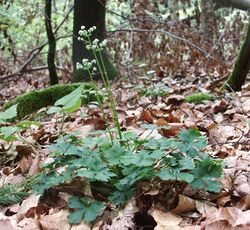Biology:Sanicula europaea
| Sanicle | |
|---|---|

| |
| Scientific classification Error creating thumbnail: Unable to save thumbnail to destination
| |
| Kingdom: | Plantae |
| Clade: | Tracheophytes |
| Clade: | Angiosperms |
| Clade: | Eudicots |
| Clade: | Asterids |
| Order: | Apiales |
| Family: | Apiaceae |
| Genus: | Sanicula |
| Species: | S. europaea
|
| Binomial name | |
| Sanicula europaea | |
Sanicula europaea, the sanicle or wood sanicle, is a perennial plant of the family Apiaceae.
It has traditionally been a favoured ingredient of many herbal remedies, and of it was said "he who has sanicle and self-heal needs neither physician nor surgeon".[1][2]:342
Description
Sanicula europea L. grows to 60 cm high and is glabrous with coarsely toothed leaves.[3] The pinkish flowers are borne in tight spherical umbels and are followed by bristly fruits which easily attach to clothing or animal fur and are thus easily distributed. The leaves are lobed and glossy, dark green.
Habitat
It is widespread in shady places[4] in woodland across Europe.
Etymology
Sanicula comes from sanus, Latin for "healthy", reflecting its use in traditional remedies.[5]
Uses
Sanicula europaea was used in Europe for healing wounds and cleaning.[6][5] Filtered leaf extracts of sanicula europaea have shown some antiviral properties, inhibiting the replication of type 2 Human parainfluenza viruses (HPIV-2).[7]
Infusions of sanicle, made with water or wine, were commonly used in France to cure dysentery, ulcers and kidney injuries.[8] To this list Culpeper added that sanicle heals tumours in any part of the body, and alleviates gonorrhoea, bowel pain and more.[2]
The roots have been used in the traditional Austrian medicine internally (as tea) or externally (as ointment) for treatment of disorders of the skin, respiratory tract, locomotor system, gastrointestinal tract, and infections.[9]
References
- ↑ Jacob, John (1836) (in en). West Devon and Cornwall Flora. Devonport: Longman, Rees, Orme, Brown, Green, & Longman. https://books.google.com/books?id=6-sYAAAAYAAJ&q=sanicle&pg=PP36.
- ↑ 2.0 2.1 Culpeper, Nicholas (1858) (in en). Culpeper's Complete Herbal. Halifax: Milner and Sowerby. p. 331. https://books.google.com/books?id=jZcyAQAAMAAJ&q=sanicle&pg=PA330.
- ↑ Clapham, A.R., Tutin, T.G. and Warburg, E.F. 1968. Excursion Flora of the British Isles. Cambridge University Press. ISBN:0 521 04656 4[page needed]
- ↑ Webb, D,A., Parnell, J. and Doogue, D. 1996. An Irish Flora Dundalgan Press Ltd. Dundalk. ISBN:0-85221-131-7[page needed]
- ↑ 5.0 5.1 America, Garden Club of (1933). "Garden Club of America" (in en). Bulletin: 10. https://books.google.com/books?id=d28LAQAAMAAJ&q=Sanicula+europaea+sanus.
- ↑ Redwood, Theophilus (1848) (in en). Gray's Supplement to the Pharmacopoeia. London: Longman and co. p. 315. https://archive.org/details/b21904807. "Sanicula europaea."
- ↑ Karagöz, A; Arda, N; Gören, N; Nagata, K; Kuru, A (August 1999). "Antiviral activity of Sanicula europaea L. extracts on multiplication of human parainfluenza virus type 2.". Phytotherapy Research 13 (5): 436–8. doi:10.1002/(sici)1099-1573(199908/09)13:5<436::aid-ptr459>3.0.co;2-q. PMID 10441789.
- ↑ Dodoens, Rembert (1557) (in fr). Histoire des plantes, en laquelle est contenue l'histoire entière des herbes.... Anvers: Jean Loë. p. 106. https://books.google.com/books?id=of1NAAAAcAAJ&q=Sanicle&pg=PA105.
- ↑ Vogl, Sylvia; Picker, Paolo; Mihaly-Bison, Judit; Fakhrudin, Nanang; Atanasov, Atanas G.; Heiss, Elke H.; Wawrosch, Christoph; Reznicek, Gottfried et al. (2013). "Ethnopharmacological in vitro studies on Austria's folk medicine—An unexplored lore in vitro anti-inflammatory activities of 71 Austrian traditional herbal drugs". Journal of Ethnopharmacology 149 (3): 750–71. doi:10.1016/j.jep.2013.06.007. PMID 23770053.
External links
Wikidata ☰ Q157846 entry
 |


